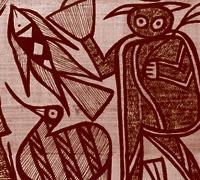“Folklore is a body of traditional belief, custom, and expression, handed down largely by word of mouth and circulating chiefly outside of commercial and academic means of communication and instruction. Every group bound together by common interests and purposes, whether educated or uneducated, rural or urban, possesses a body of traditions which may be called its folklore. Into these traditions enter many elements, individual, popular, and even "literary," but all are absorbed and assimilated through repetition and variation into a pattern which has value and continuity for the group as a whole.”
Benjamin A. Botkin, 1938
On this page:
- Introduction
- Frequently Asked Questions
- Required Courses
- Contact
Introduction
Folklore and Mythology as a discipline focuses on the study of society, past or present, through its cultural documents and artifacts—its folklore—and uses a variety of methodologies drawn from the humanities and social sciences to understand them. To focus on the folklore and mythology of a society (at local, regional, national, or even trans-national levels) is to understand how that group or community defines itself through stories, music, food, folktales, legends, dramas, dance, rituals, beliefs, proverbs, epics, myths, customs, law codes, festival celebrations, “wisdom literature,” and many other forms of expressive culture and artistic communication. To study the folklore and mythology of any group is to discover how that group identifies itself in relation to others.
Inherently interdisciplinary, the study of Folklore and Mythology often draws resources from several disciplines, while maintaining its own methodological lens. Students wishing to meet the requirements for a secondary field in Folklore and Mythology must take GENED 1097. Tradition, Performance, and Culture, one small topical seminar in the field, and three other courses chosen from Folklore and Mythology and/or cross-listed courses as listed in the Course Catalog and on the Folklore and Mythology website.
Students wishing for a particularly focused and coherent program of study should make an appointment with the Head Tutor or Chair of the program to discuss options. Students who notify the Head Tutor early on of their intention to pursue a secondary field in Folklore and Mythology will insure that they are invited to special lectures, film showings, lunches and receptions.
FAQ
Do all courses need to be taken for letter grade? If so, is there a grade minimum?
Yes, courses need to be taken for a letter grade, with the exception of approved Freshman Seminars. Grades should be B- or above.
Will relevant freshman seminars count?
Yes, relevant Freshman Seminars will count.
Can courses from study abroad or Harvard summer school count?
Harvard summer school courses can count and study abroad courses taught by our faculty (i.e. in the summer) can count. Students may petition to count at most one study abroad course that is not taught by our faculty by presenting syllabi and papers from the course to the Head Tutor or Chairman.
When do you want students to come and meet with you? Do they have to meet with you before they have finished their requirements?
Students are encouraged to meet with the Head Tutor to discuss their plans for pursuing a Secondary Field in F&M. By doing so, they will not only receive advice on courses, they will also be invited to concentration activities and events.
Does "signing up" give students preferential access to limited-enrollment courses?
Preferential access to limited enrollment courses will be determined by each faculty member for his or her own course.
Required Courses (5)
Two half-courses:
- Foundational course (currently taught as GENED 1196, previously taught as FM 100 and GENED 1097): Surveys the major forms of folklore (e.g., myths, legends, epics, beliefs, rituals, festivals) and the theoretical approaches used to understand and interpret “texts” drawn from the world of traditional expression and ritualized behavior. (Craycraft)
- One Folklore and Mythology small seminar course, examining specific topics in the field
Three half-courses from among those offered in Folklore & Mythology or the cross-listings.
Contact:
Sarah Craycraft
Head Tutor
Warren House 103
scraycraft@fas.harvard.edu

